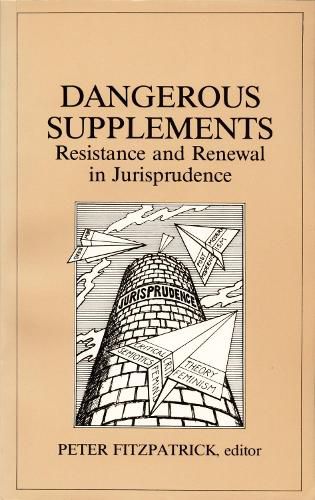Readings Newsletter
Become a Readings Member to make your shopping experience even easier.
Sign in or sign up for free!
You’re not far away from qualifying for FREE standard shipping within Australia
You’ve qualified for FREE standard shipping within Australia
The cart is loading…






In Dangerous Supplements expert legal scholars employing a variety of theoretical perspectives-feminism, poststructuralism, semiotics, and Marxism-challenge predominating views in jurisprudence. Prevailing notions of the nature of the law, they argue, have failed to recognize the law’s dependence on social constructs and the indeterminance of language. The contributors further claim that proponents of traditional notions have borrowed knowledge from other fields, only to reject that knowledge as ultimately subversive and dangerous in its ramifications. Taking as a point of departure H. L. A. Hart’s The Concept of the Law, Peter Fitzgerald shows how Hart adopted Wittgenstein’s linguistic theory to overthrow J. L. Austin’s simple conception of rules and habits in law, only to jettison this theory in order to locate the essence of law in its evolution from a primal scene. Other chapters examine the way in which the setting of English law above social relations has masked an imperial mission; how the philosophies of Hayek and Marx, as well as the discourses of liberalism, feminism, semiotics, and poststructuralism, have been assiduously marginalized and rendered inessential to jurisprudence.
$9.00 standard shipping within Australia
FREE standard shipping within Australia for orders over $100.00
Express & International shipping calculated at checkout
Stock availability can be subject to change without notice. We recommend calling the shop or contacting our online team to check availability of low stock items. Please see our Shopping Online page for more details.
In Dangerous Supplements expert legal scholars employing a variety of theoretical perspectives-feminism, poststructuralism, semiotics, and Marxism-challenge predominating views in jurisprudence. Prevailing notions of the nature of the law, they argue, have failed to recognize the law’s dependence on social constructs and the indeterminance of language. The contributors further claim that proponents of traditional notions have borrowed knowledge from other fields, only to reject that knowledge as ultimately subversive and dangerous in its ramifications. Taking as a point of departure H. L. A. Hart’s The Concept of the Law, Peter Fitzgerald shows how Hart adopted Wittgenstein’s linguistic theory to overthrow J. L. Austin’s simple conception of rules and habits in law, only to jettison this theory in order to locate the essence of law in its evolution from a primal scene. Other chapters examine the way in which the setting of English law above social relations has masked an imperial mission; how the philosophies of Hayek and Marx, as well as the discourses of liberalism, feminism, semiotics, and poststructuralism, have been assiduously marginalized and rendered inessential to jurisprudence.